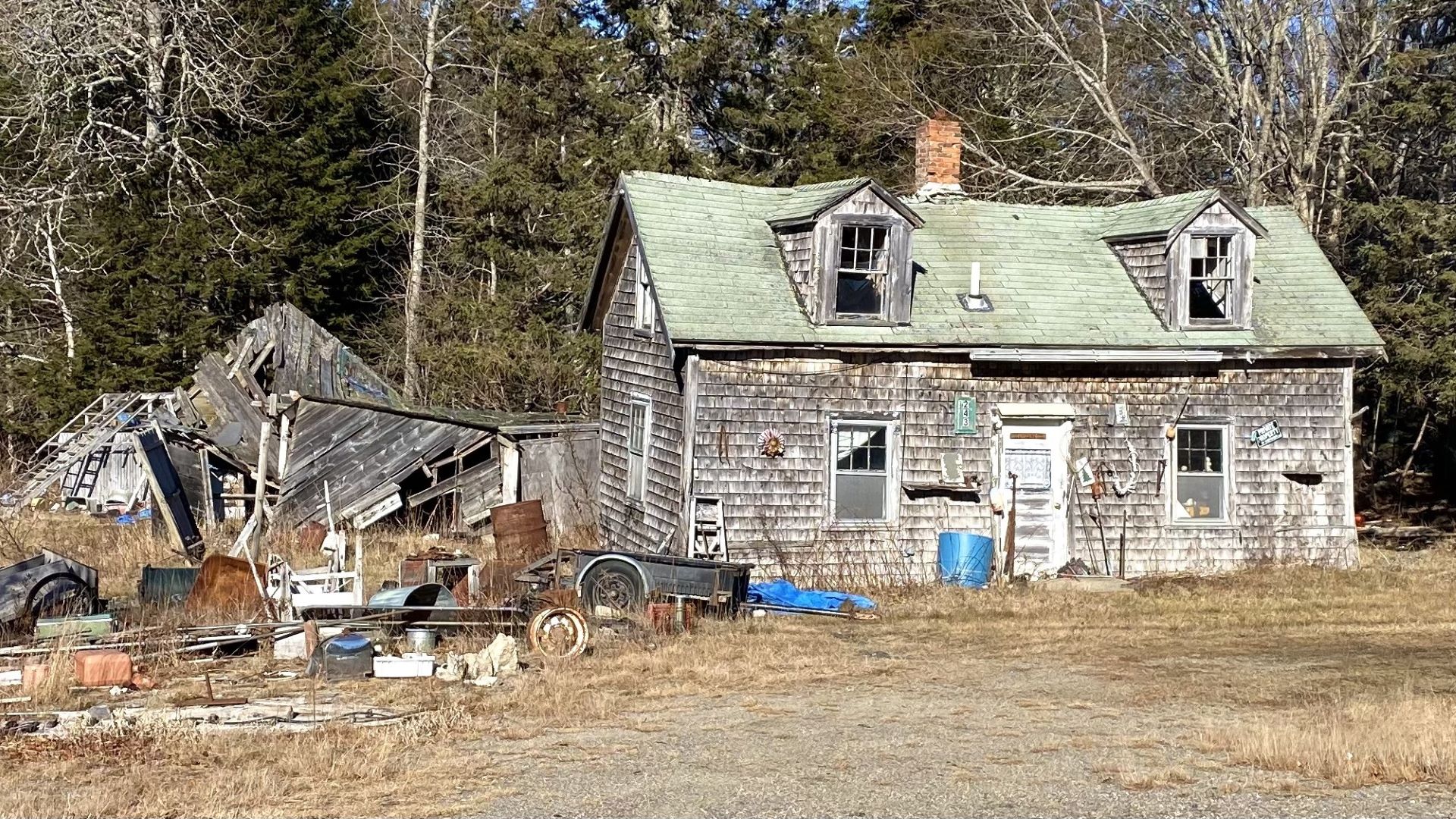At first blush, Downeast Maine’s pandemic-era growth spurt seemed like a mixed blessing, boosting the population and spurring new businesses, but also ramping up housing prices. Now, community leaders wonder, how well prepared is the historically impoverished rural county to handle increased demands?
The most immediate concern is housing.
A rental shortage and soaring rents have many Washington County residents across all income levels scrounging for housing. Some are resorting to extreme measures. Sarina Brooks, a licensed clinical social worker, and her younger sister, Melissa Brooks, who is low-income, lost their apartment after their landlady died. The full-time counselor got creative and, with help from family and friends, became her own contractor.
“I already owned a shed that my friend graciously let me put on her property, so I purchased another shed and nestled it against the first shed inside an addition,” Brooks said, speaking from the porch of their sky-blue “tiny house” in East Machias.
Making matters worse, the Maine Housing Authority reports that there are only 42 affordable housing developments countywide. At last count, there were 706 either income-based, subsidized or reduced rent apartments. Of those, only 56 units are available — not nearly enough to meet current and growing demand, resulting in waiting lists stretching sometimes over a year.
RELATED: Housing shortage leaves some Washington County residents scrambling
The situation is made all the more dire by the upcoming expiration of some U.S. Department of Agriculture (USDA) housing contracts that have kept rents low at some 300 developments statewide, including 16 in Washington County that total 399 units.
Under the Housing Act of 1949, the Farmers Home Administration made direct loans to private and nonprofit entities to develop and/or construct housing for the elderly and low- or middle-income individuals and families in rural communities. The contracts, now administered through the U.S. Department of Agriculture Rural Development 515 program, obligate the property owners to keep rents low for qualifying, low-income residents, who pay 30 percent of their income toward rent. The USDA picks up the remainder.
Once mortgages are paid off and contract terms expire, the property owners’ obligation to the USDA ends, potentially putting another source of affordable housing out of reach for their tenants, according to Rhiannon Hampson, the USDA Rural Development state director in Maine.
Officials say efforts are made to entice owners to renew contracts. In some cases, favorable lending is offered to the owner to complete improvements; possible refinancing to repay some owners’ equity; or possibly more rental assistance is available for single-unit properties to improve cash flow. Still, in many cases, Hampson said owners simply want out.
“A lot of those owners are very elderly or maybe even passing on, and their families don’t want to take that on,” Hampson said. “We’re trying to transition those developments so that they can remain affordable housing.”
At least a few owners are eager to work with the USDA to make sure their mission to create affordable housing is preserved, including 87-year-old Richard Fickett of Cherryfield, who owns six properties with a total of 138 units in Cherryfield and five neighboring towns.
“I started this when I was in my 30s, not because I wanted to get some profit out of it but because I wanted to help people get housing,” Fickett said. “And we still need it. Affordable housing hasn’t been in favor with Congress for I don’t know how many years.”
If the USDA fails to transfer mortgages to new owners, rents could jump in line with current, reinvigorated Down East market rates — or disappear completely if owners decide to sell to the highest bidder when the contracts reach maturity. That will happen in waves between 2024 and 2045. Or sooner.
For mortgages written before 1986, owners can get out from underneath their USDA commitments by applying to prepay the mortgage, according to John Egan, senior program officer for strategic initiatives at the Genesis Community Loan Fund. Egan said there are at least four mortgages in the county that are eligible.
‘’If they prepay, then that’s it. Affordability is never coming back,” Egan said.
The USDA hired Genesis Fund, a Community Development Financial Institution, to help avert the crisis. The Fund is working with nonprofits and others in Washington County, as well as statewide, who are willing to assume the mortgages, varying in term from 40 to 50 years, before they mature. Egan said most of those transferred mortgages would be recast for another 50-year loan term with extended, low-income rent restrictions attached.
Sunrise Opportunities, a nonprofit that provides services and housing for the elderly and disabled in Washington County, stepped forward, willing to assume some contracts before they expire. Tom Michaud, the executive director, said historically there have been few financial incentives for owners.
“Rural development has limitations on what owners can receive for their properties,” Michaud said. “You’ve got to have a motivated person, and then there are all of these other hoops to jump through.”
Fickett remains motivated and hopeful, despite his first deal with another nonprofit several years ago falling through when he discovered the transfer would have left him with zero profit in return for nearly a half-century of his time and money invested in the properties.
Doggedly trying to pass the torch, Fickett took matters into his own hands. With approval and assistance from the USDA, he has been mentoring an anonymous individual from the private sector, grooming him to take over once the training is complete and financing is secured for the purchase. Fickett said the ball is now in the government’s court.
“Rural Development (USDA) is going to have to do better. They’re going to have to be creative and raise some money like any other business,” said Fickett.
According to Egan, Maine has two state resources it can offer to nonprofit buyers taking over pre-existing mortgages: the State Affordable Housing Credit (which also can be sold to private sector buyers), and a Community Development Block Grant (CDBG) set aside for affordable housing preservation. New low-interest loans for capital, typically 1 percent, can be added to help make a reasonable offer of sale.
Recent policy changes approved at the federal level are also giving state housing officials greater latitude. The changes allow the Fund to develop a new streamlined mortgage transfer plan. The pilot program, being rolled out in the coming weeks, allows state USDA officials to “peel off” mortgages that are the most at risk, and don’t require additional financing, moving them to the head of the line in the federal transfer process, according to Liza Fleming-Ives, executive director for the Fund.
The county’s bleak housing picture finally grabbed the attention of all of Maine’s federal and state housing agencies — long focused more intently on preserving housing downstate in more populated areas. The Maine Housing Authority, which administers federal Section 8 housing, Maine’s offices for HUD, and the USDA are partnering to find solutions, and better promote funding and programs already available.
Department heads report having active programs and a new pipeline of federal funding, including a chunk of President Biden’s $10 billion of mandatory HUD Grants to Reduce Affordable Housing Barriers for would-be developers and individual home buyers. For income-qualifying residents, the USDA alone offers direct and guaranteed single-family home loans, often with subsidies; 1 percent, home repair loans up to $40,000 for seniors; and USDA-backed loans for developers to build income-capped multi-family housing.
“We’ve got money here and more money at the national office; we can go ahead and take more applications. So, let’s go, let’s go, let’s go,” Hampson said.
Do you have important Washington County stories that we should cover? We want to hear your ideas by email: gro.r1751319576otino1751319576menia1751319576meht@1751319576tcatn1751319576oc1751319576.








